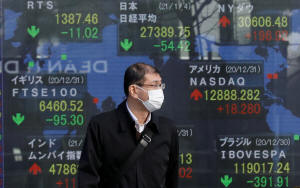Shares reach record high, oil tops $60 a barrel
 Send a link to a friend
Send a link to a friend
 [February 08, 2021]
By Marc Jones [February 08, 2021]
By Marc Jones
LONDON (Reuters) - World shares hit a
record high on Monday and oil surpassed $60 a barrel for the first time
in a year, on hopes that a $1.9 trillion COVID-19 aid package will be
passed by U.S. lawmakers as soon as this month.
Even news that South Africa had halted the rollout of AstraZeneca's
vaccine after a study showed it gave only limited protection against the
country's more contagious variant of the virus wasn't going to put
equity markets off.
MSCI's 50-country index of world stocks hit its ninth record high of
2021 overnight as Tokyo's Nikkei jumped on talk of Japan relaxing
emergency restrictions and as China's markets got busy before the start
of the lunar new year.
Europe then made a strong start as higher oil prices and inflation
expectations lifted basic resource and banking shares, and France's
Veolia launched a hostile 11.3 billion-euro takeover bid for waste and
water rival Suez.
"A generalised risk-on tone is pushing stocks higher," UniCredit's
analysts said in a note.

Bond markets were focused on how far inflation might rise if the current
mix of stimulus, rising oil and food prices and expectations for a
reopening economies continue to hold.
Ten-year U.S. Treasury yields, which are one of the main drivers of
global borrowing costs, climbed to 1.2%, their highest since the peak of
coronavirus uncertainty last March. Break-even rates, which are designed
to account for inflation, traded as high as 2.21%, their highest since
2014.
In Europe, Germany's 10-year yields were up 3 basis points at -0.415%,
near five-month highs.
"It will be hard not to see inflation in something when we get what is
likely to be a short-term stimulus boost," Deutsche Bank's Jim Reid
said, referring to planned U.S. stimulus.
"Whether that will be in goods, wages or asset prices or all three
remains to be seen, but it seems inevitable there will be an impact."
Brent crude touched an intraday high of $60.06 a barrel, the highest
since January last year.
Saudi Arabia's pledge of extra supply cuts in February and March on the
back of reductions by other OPEC members its allies, including Russia,
is helping to balance global markets and support prices.
In a sign that supplies are tightening, the six-month Brent spread hit
its highest in more than year, $2.45. OCBC's economist Howie Lee said
the Saudis had sent another "very bullish signal" last week by keeping
its Asian prices unchanged.
[to top of second column]
|

A man wearing a facial mask, following the coronavirus disease
(COVID-19) outbreak, stands in front of an electric board showing
Nikkei (top in C) and other countries stock index outside a
brokerage at a business district in Tokyo, Japan, January 4, 2021.
REUTERS/Kim Kyung-Hoon

"I don't think anybody dares to short the market when Saudi is like
this," he said.
STIMULUS
Asia's overnight rally had seen Japan's Nikkei close up 2%, Chinese
blue-chip shares advance 1.3% and Australian shares finish 0.6%
higher.
Wall Street futures were also pointing higher after the Nasdaq and
S&P 500 both climbed to record highs on Friday as weak monthly U.S.
jobs data supported expectations of stimulus and after some strong
corporate earning.
U.S. President Joe Biden and his Democratic allies in Congress
forged ahead with their stimulus plan on Friday as lawmakers
approved a budget outline that will allow them to muscle through in
the coming weeks without Republican support.
U.S. Treasury Secretary Janet Yallen predicted the United States
would reach full employment next year if Congress can pass its
support package.
"That's a big call, given full employment is 4.1%, but one that will
sit well with the market at a time when the vaccination program is
being rolled out efficiently in a number of countries," said Chris
Weston, Melbourne-based chief strategist at Pepperstone.
Expectations of a U.S. economic recovery have not boosted the
dollar, though, "because this shift in prospects is seen by the
market as part of a global recovery," Westpac economists wrote in a
note.

"Investors therefore favour risk taking, and so value the safety of
the U.S. dollar less."
Indeed, the dollar came off a four-month high against the Japanese
yen to be last at 105.50.
The euro was weaker at $1.2027 after rising 0.7% on Friday to a
one-week high.
The risk-sensitive Australian dollar eased from a one-week high to
$0.7675 while South Africa's rand fell nearly 0.5% after its vaccine
troubles.
(Additional reporting by Swati Pandey in Sydney, editing by Larry
King)
[© 2021 Thomson Reuters. All rights
reserved.] Copyright 2021 Reuters. All rights reserved. This material may not be published,
broadcast, rewritten or redistributed.
Thompson Reuters is solely responsible for this content. |